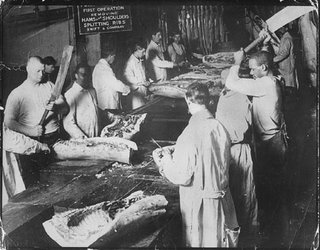 In the first three chapters, we are introduced to some of the book’s main characters, notably Katniss Everdeen, the protagonist of the novel. We also learn all the basic facts about the world in which the story takes place. Katniss is a sixteen-year-old girl living in what is essentially a dystopia, a fictional political state in which life is awful (George Orwell’s 1984 was also a dystopian novel). The book is set at some unspecified time in the future, by which point the countries of North America as we currently know them have dissolved. The cause of this dissolution isn’t fully explained, but Katniss does talk about the natural disasters that led to it. Among them are rising sea levels and severe storms, which suggest global warming played a role, as those are two of the most serious consequences scientists predict warming will cause. We also know there are widespread food shortages. The government of Panem, the country that rose up after North America’s collapse, is totalitarian. It monitors the speech and actions of its citizens and mercilessly punishes anything it construes as dissent. The Hunger Games that give the book its title are the ultimate expression of its mercilessness and its power over its citizens.
In the first three chapters, we are introduced to some of the book’s main characters, notably Katniss Everdeen, the protagonist of the novel. We also learn all the basic facts about the world in which the story takes place. Katniss is a sixteen-year-old girl living in what is essentially a dystopia, a fictional political state in which life is awful (George Orwell’s 1984 was also a dystopian novel). The book is set at some unspecified time in the future, by which point the countries of North America as we currently know them have dissolved. The cause of this dissolution isn’t fully explained, but Katniss does talk about the natural disasters that led to it. Among them are rising sea levels and severe storms, which suggest global warming played a role, as those are two of the most serious consequences scientists predict warming will cause. We also know there are widespread food shortages. The government of Panem, the country that rose up after North America’s collapse, is totalitarian. It monitors the speech and actions of its citizens and mercilessly punishes anything it construes as dissent. The Hunger Games that give the book its title are the ultimate expression of its mercilessness and its power over its citizens.
But life is also terrible for the people of District 12 for more immediate reasons. Few people, we learn, have enough to eat. Many are malnourished and death by starvation is common. Moreover, the main industry in the region is coal mining, which is notoriously difficult and dangerous work. Katniss describes the miners, both men and women, heading to work with hunched shoulders and swollen knuckles, suggesting how physically hard the job is. We also know that both Katniss’s and Gale’s fathers died from an explosion in the mine. District 12 is in what’s presently known as Appalachia, which is among the poorest regions in the modern United States, and from Katniss’s description it seems the district is among the poorest regions of Panem. 






